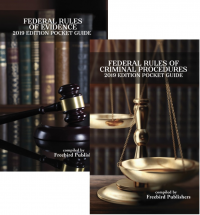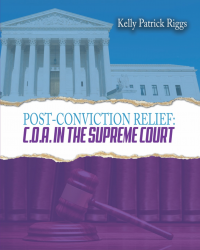Publishing Company Employs Advocates Who Battle from Within the Criminal Injustice System
The most enthusiastic advocates are the people who have suffered from injustice the most. No one understands this better than Freebird Publishers (www.freebirdpublishers.com) who now helps victims around the country. Freebird Publishers understand that knowledge is power to seek justice and they know where to find it. Freebird Publishers has invested years in finding the most informed legal advocates, over the years, and now puts their expertise to good use. Together they have release self-help books for the layman at law that include:
This is the fourth book in a legal series by Raymond E. Lumsden designed to teach and assist pro se prisoners, and the general public, in post-conviction proceedings. This extremely easy-to-use tutorial packed full with sample motions, letters, forms, and pleadings, will assist you in advancing your rights in federal court. It's a must-have for anyone attempting to do so pro se. Logically written in layman terms for easy comprehension and strategically outlined and organized, this book allows you to absorb and easily follow the complicated and twisted path that is the federal court system. This is an invaluable tool and resource for any pro se user who hopes to achieve relief in their federal post-conviction habeas corpus. Herein is everything you will ever need to know, at your fingertips for use and application, in your federal habeas corpus. Many already own a copy, and now you should too. Your freedom is waiting.
This book is written in layman's terms. It will provide you with the understanding that the courts don't want you to have. This book is not only an informative research guide it is also a plain terms resource manual.
This book is a continuation of a long overdue effort, to make sense of the habeas corpus process in layman's terms. In this installment, to the series, you will learn how to advance through to appeal. You will be provided with the necessary filings to journey through the court of appeals, step-by-step, as you file a certificate of appealability, an opening brief, a reply, and a petition for rehearing.
This is the third book in the Post-Conviction Relief series. This installment is written to correct the most basic problem in your case, the way you think.
This is the fourth book in the Post-Conviction Relief series. This book is written in layman's terms. It will provide you with the understanding that the courts don't want you to have. This book is not only an informative research guide it is also a plain terms resource manual. It's written with the same perspective as my first three. Its purpose is to give you sound ideas with which you can identify winning claims for habeas corpus relief. When studying your own criminal case or that of another, the task becomes much easier when you can compare the facts of your case to cases that have prevailed in the past.
This is the fifth book in the Post-Conviction Relief series. Post-Conviction Relief: C.O.A. In the Supreme Court is a big step in the fight against Mass-Incarceration, America's greatest social crisis. This book is a must have for anyone who seeks to petition for relief in The Supreme Court of The United States
At sentencing defendants are informed of their right to appeal. After appeal lawyers tell their clients about their right to file for post-conviction relief under 28 U.S.C.: 2255, but not without laughter in their voice. What they don't tell their clients is that a: 2255 motion cannot be based on actual innocence or over sentencing. This book fills that gap. It explains how to take action for both actual innocence and over sentencing along with explaining which legal mechanism to use.
This easy-to-follow and understand guide provides you with the tools necessary to obtain relief in your legal issues. Clear, concise and direct legal writing is essential for inmates especially where the "deck is already stacked against you. Prison "writ-writers" tend to use opaque, jargon-filled writing, which only serves to further alienate those reading it. In this manner relief is hard-pressed to obtain, if at all. This book, created for inmates, is the most practical and effective manual available for pro se use. Every inmate should own a copy and many already do. If you want to win relief in your writing … this is the book for you.
First adopted in 1975, the Federal Rules of Evidence codify the evidence law that applies in United States federal courts. In addition, many states in the United States have either adopted the Federal Rules of Evidence, with or without local variations, or have revised their own evidence rules or codes to at least partially follow the federal rules. In general, the purpose of rules of evidence is to regulate the evidence that the jury may use to reach a verdict. Historically, the rules of evidence reflected a marked distrust of jurors. The Federal Rules of Evidence strive to eliminate this distrust and encourage admitting evidence in close cases.
The Federal Rules of Criminal Procedure are the procedural rules that govern how federal criminal prosecutions are conducted in United States district courts and the general trial courts of the U.S. government.
Ineffective assistance of counsel has become a national epidemic. This travesty is at the root of the Mass-Incarceration problem that currently plagues the American people. What's truly shocking is the years lost and the pain caused because of lawyers and judges who refuse to provide their honest service. You don't have to be a victim. Kelly Patrick Riggs has spent the last seven years in an intense study of advanced Habeas Corpus procedure and the ineffective assistance of counsel phenomenon. He has discovered that the ineffective assistance of counsel is the norm, rather than the exception, in the American criminal justice system. He has learned how to apply the relevant laws and procedures and has guided many federal prisoners in their pursuit of Post-Conviction Relief. This book is one of the most comprehensive guides to understanding a lawyer's obligations, to a client who is accused of a crime. It explains what you can expect from a competent lawyer in a criminal trial and how to stop the harm of counsel ineffectiveness before it becomes final.
This book is an invaluable and indispensable resource for the pro se inmate seeking to protect their constitutional rights in prison and obtaining reform. Comprehensive, precise, and layman guidance provides pro se inmates with information regarding: Conditions of Confinement" Civil Rights in Prison" Due Process" How to Litigate" Legal Research" Preparing Legal Documents Written by an inmate for inmates, the Pro Se Section 1983 manual is an authoritative, organized, and easy to understand manual designed to bring results and relief. Every inmate wishing to protect their civil rights should have a copy. There is no other book like this one related to Section 1983.
This book is written specifically for the pro se inmate. Within its pages lay the necessary information, process, and instructions necessary in obtaining relief in your state habeas corpus.
From the initial investigation through the filing of your writ of habeas corpus, you are provided effective forms, motions, and detailed instructions specific to state level habeas corpus. Armed with this book, relief is only a few pages away if done properly and effectively. Any pro se inmate serious about post-conviction relief should order a copy. Even if you aren't an inmate and are looking to overturn a conviction, sentence, etc. this is the book for you. Includes hundreds of case cites and actual opinions for you to use.












































Comments